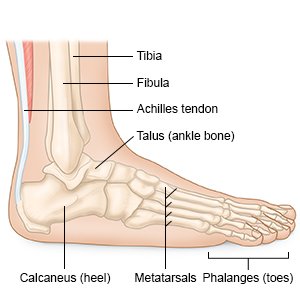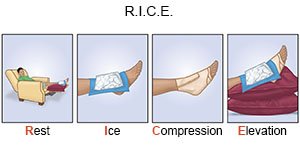Achilles Tendon Rupture
Medically reviewed by Drugs.com. Last updated on May 6, 2024.
AMBULATORY CARE:
An Achilles tendon rupture
happens when your Achilles tendon tears, or separates from your heel bone. The Achilles tendon connects your calf muscle to your heel bone. It allows you to point your foot down and to rise on your toes. An Achilles tendon rupture may be caused by a sports injury or a fall.
 |
Signs and symptoms include the following:
- A sudden pop, snap, or crack at the back of your leg
- Severe pain in your leg or ankle, especially when your foot is bent down
- Swelling, stiffness, or weakness in your leg or ankle
- A bruise on the back of your ankle
- Trouble moving or putting weight on your leg
Seek care immediately if:
- Your leg feels warm, tender, and painful. It may look swollen and red.
- Your foot or toes are numb.
Call your doctor if:
- You have a fever.
- Your symptoms do not get better with treatment.
- You have questions or concerns about your condition or care.
Treatment for an Achilles tendon rupture
may depend on your age and activity level. Medicine may be prescribed to decrease pain and swelling. You will need to use a support device such as crutches, or wear a cast or splint. These devices will decrease pressure on your tendon and help it heal. Once you are stronger, you may need physical therapy to increase your flexibility and strength. Some Achilles tendon ruptures may require surgery.
- NSAIDs , such as ibuprofen, help decrease swelling, pain, and fever. This medicine is available with or without a doctor's order. NSAIDs can cause stomach bleeding or kidney problems in certain people. If you take blood thinner medicine, always ask your healthcare provider if NSAIDs are safe for you. Always read the medicine label and follow directions.
- Prescription pain medicine may be given. Ask your healthcare provider how to take this medicine safely. Some prescription pain medicines contain acetaminophen. Do not take other medicines that contain acetaminophen without talking to your healthcare provider. Too much acetaminophen may cause liver damage. Prescription pain medicine may cause constipation. Ask your healthcare provider how to prevent or treat constipation.
- Take your medicine as directed. Contact your healthcare provider if you think your medicine is not helping or if you have side effects. Tell your provider if you are allergic to any medicine. Keep a list of the medicines, vitamins, and herbs you take. Include the amounts, and when and why you take them. Bring the list or the pill bottles to follow-up visits. Carry your medicine list with you in case of an emergency.
Treatment options
The following list of medications are related to or used in the treatment of this condition.
Manage your symptoms:
 |
- Use a support device as directed. You may need crutches or a cane to decrease stress and pressure on your tendon. Your healthcare provider will tell you how much weight you can put on your leg. Ask for more information about how to use crutches or a cane correctly. Wear your brace or splint as directed. This devices will keep your tendon straight and help it heal.
- Rest as directed. Your healthcare provider will tell you when it is okay to walk and play sports. You may not be able to play sports for 6 months or longer. Ask when you can go back to work or school. Do not drive until your healthcare provider says it is okay.
- Apply ice on your Achilles tendon for 15 to 20 minutes every hour or as directed. Use an ice pack, or put crushed ice in a plastic bag. Cover it with a towel. Ice helps prevent tissue damage and decreases swelling and pain.
- Elevate your heel above the level of your heart as often as you can. This will help decrease swelling and pain. Prop your heel on pillows or blankets to keep it elevated comfortably.
Go to physical therapy as directed:
A physical therapist teaches you exercises to help improve movement and strength, and to decrease pain. You may not start physical therapy for a few weeks or until your cast is removed.
Follow up with your doctor as directed:
You will need to return to have your cast adjusted. Write down your questions so you remember to ask them during your visits.
© Copyright Merative 2024 Information is for End User's use only and may not be sold, redistributed or otherwise used for commercial purposes.
The above information is an educational aid only. It is not intended as medical advice for individual conditions or treatments. Talk to your doctor, nurse or pharmacist before following any medical regimen to see if it is safe and effective for you.
Learn more about Achilles Tendon Rupture
Treatment options
Care guides
Symptoms and treatments
Further information
Always consult your healthcare provider to ensure the information displayed on this page applies to your personal circumstances.
